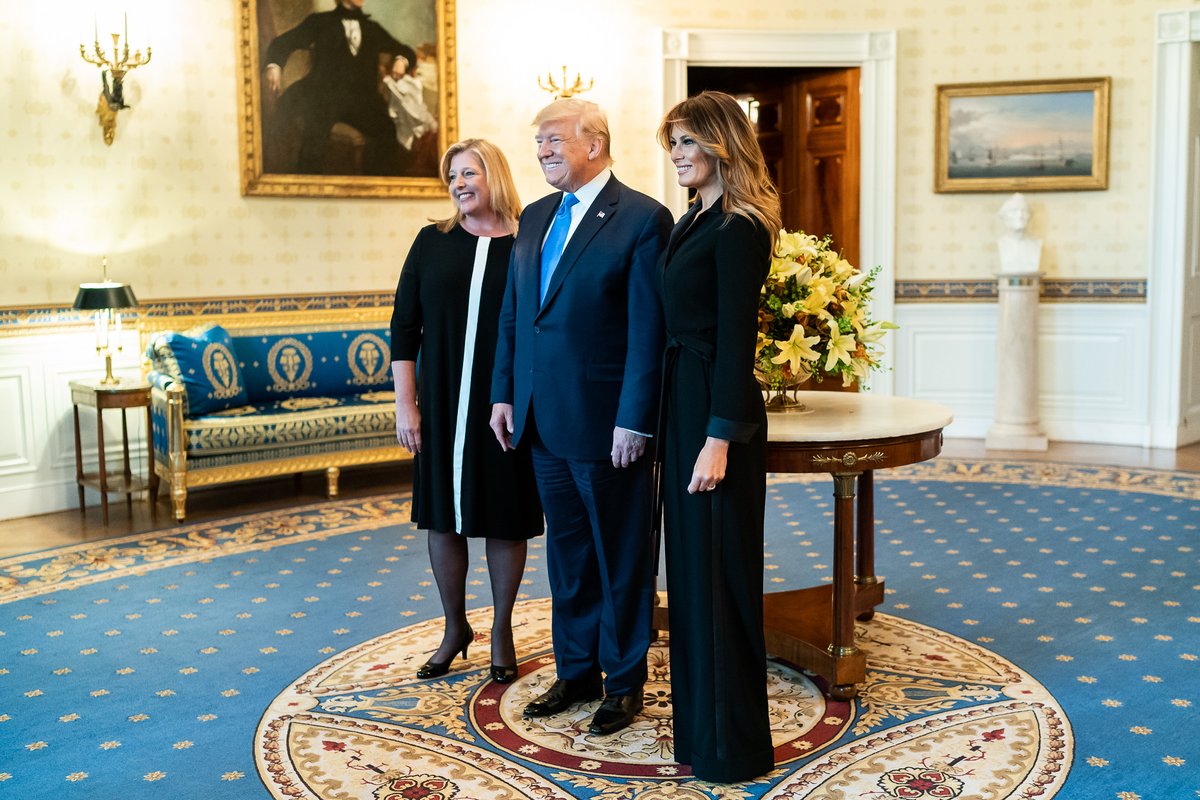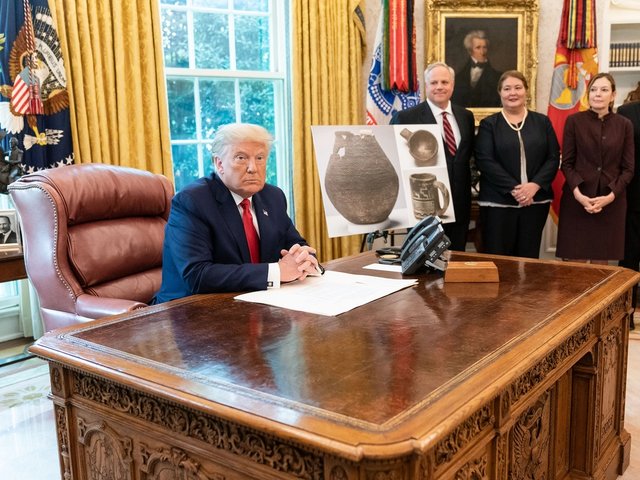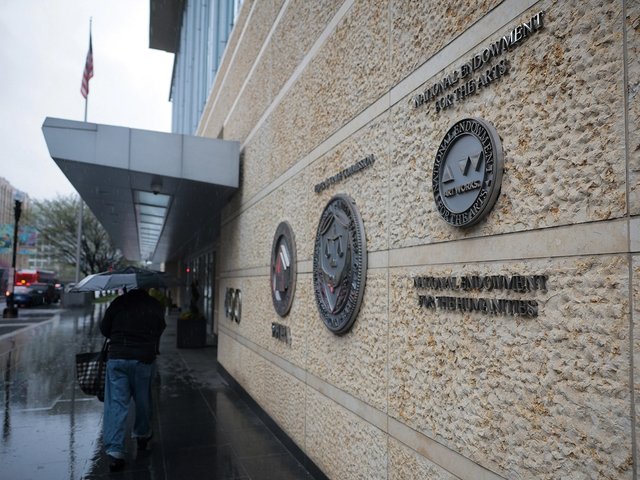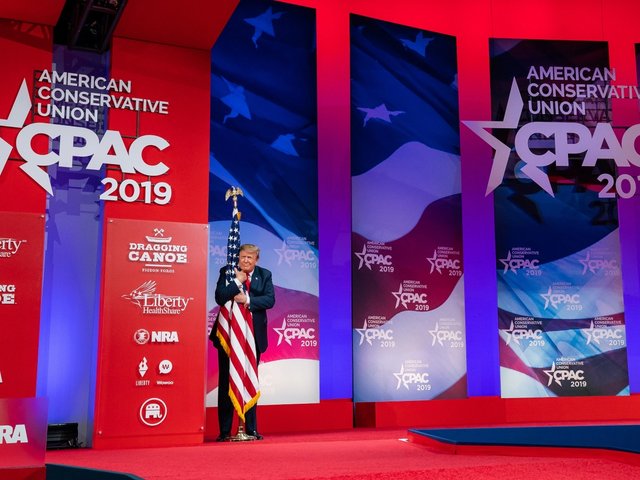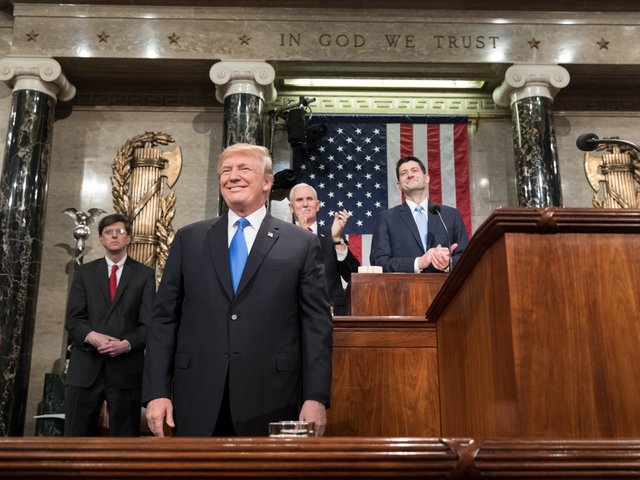The National Endowment for the Arts (NEA), the last major US federal cultural agency still left standing in Washington, DC, has come under the axe of US President Donald Trump once again. As part of Trump’s “skinny” discretionary budget request for the 2026 fiscal year, released on Friday (2 May), the president has proposed that Congress eliminate funding for agencies including the NEA, the National Endowment for the Humanities (NEH), and the Institute of Museum and Library Services (IMLS)—although the last agency is misnamed—as well as the Corporation for Public Broadcasting. This is “consistent with the president’s efforts to decrease the size of the federal government to enhance accountability, reduce waste and reduce unnecessary governmental entities,” the proposal reads. “Remaining funds account for costs of orderly shutdowns.”
The president’s proposal is just a blueprint for Congress, which is responsible for setting the federal budget and allocating funds to specific departments and services. During his first term as president, Trump repeatedly tried to defund the NEA, reducing its budget to zero in his annual proposals. But at that time, Congress rebuffed his efforts, with senators and congresspeople from both sides of the political spectrum speaking up to defend the country’s cultural agencies and increasing their funding through bipartisan spending bills. It is unclear if that same support will be seen in Trump’s second term, or if the White House will honour congressionally appropriated funding, as the executive branch has sought to wield more power in how government money is spent.
Speaker of the House Mike Johnson was quick to endorse Trump’s proposal, saying his “plan ensures every federal-taxpayer dollar spent is used to serve the American people, not a bloated bureaucracy or partisan pet projects”.
The agency’s interim leader, Mary Anne Carter, seemed to acknowledge that cuts were on the horizon for the NEA on Thursday afternoon (1 May), during the 215th meeting of the National Council on the Arts, which advises the agency on its grantmaking. “Obviously, there's going to be change. Change is scary, but change also lets you reimagine. Going down the road, the agency may be smaller, we may be leaner, but I believe we're going to be okay,” she said at the time, voicing some optimism despite the looming threats to the country’s arts infrastructure.
Carter’s comments came on the heels of visits by representatives from the Department of Government Efficiency (Doge) at the NEA offices over the past two weeks, where they have been reviewing the agency’s budget, programming and staffing, according to multiple sources close to the agency who asked to remain anonymous. The NEA shares a building with the NEH, where Doge summarily terminated 80% of around 145 staff members and cancelled grants last month as part of Trump’s move to dismantle large swathes of the federal government.
Those efforts have been somewhat checked by federal judges, including US District Judge Richard Leon, who on 1 May handed down a “narrow” temporary restraining order against the Trump administration, barring it from taking any more steps towards closing the IMLS, firing any staffers or cancelling contracts while a lawsuit brought by the American Library Association and the American Federation of State, County and Municipal Employees is pending. Another lawsuit—filed the same day by the American Council of Learned Societies (ACLS), the American Historical Association (AHA) and the Modern Language Association (MLA)—seeks to undo the devastation caused by Doge at the NEH.
While Carter did not go into detail about how much smaller the NEA might become during Thursday’s meeting, sources tell The Art Newspaper that there will be a significant reduction to staff, largely through voluntary means, with close to half of the 140 employees taking a buyout package, deferred resignation or early retirement. “It sounds like there's going to be a fairly sizable exodus from the agency,” one source says. “And most of the people remaining are expecting that their jobs will be cut.”
Staff who take a deferred resignation will be placed on administrative leave from 1 June, and those who take voluntary separation or early retirement will be gone by the end of June, sources say. This means that some departments will be left with no remaining staff, sources add, including the Office of Accessibility, which supports arts access for people with disabilities, older adults, veterans and people living in institutions, and at least two disciplines: media arts and dance. “The decades of institutional, field and industry knowledge lost will be incalculable, especially in their relationships with smaller, rural arts communities,” a source tells The Art Newspaper.
Hours after Trump released his proposal, NEA grantees started receiving notifications from the agency that their funding had been cancelled. “The NEA is updating its grantmaking policy priorities to focus funding on projects that reflect the nation’s rich artistic heritage and creativity as prioritised by the president,” an email sent to many grantees reads. “Consequently, we are terminating awards that fall outside these new priorities.”
Among the new priorities listed are “projects that elevate the nation’s HBCUs [Historically Black Colleges and Universities] and Hispanic Serving Institutions, celebrate the 250th anniversary of American independence, foster AI competency, empower houses of worship to serve communities, assist with disaster recovery, foster skilled trade jobs, make America healthy again, support the military and veterans, support Tribal communities, make the District of Columbia safe and beautiful and support the economic development of Asian American communities.” While a new round of grants was voted on and approved during Thursday’s National Council on the Arts meeting, it is not clear if the new priorities were applied to those awards, or if they will ultimately be distributed.
“Any attempt to dismantle the National Endowment for the Arts—by eliminating funding, reducing staff, or cancelling grants—is deeply concerning, shortsighted and detrimental to our nation,” Erin Harkey, chief executive of Americans for the Arts, said in a statement. “NEA grants have touched every American, supporting projects in every congressional district and helping the arts reach parts of the country including often overlooked rural communities. America’s strength lies in its cultural richness, creativity and innovation. Now more than ever, Congress must defend and restore the NEA to ensure the arts remain accessible to all Americans. Americans for the Arts will continue to work with members of Congress to share how these proposed cuts would harm their constituents and weaken the fabric of our nation.”
A spokesperson for the NEA had not responded to requests for further comment at the time of publication. But in her closing remarks during Thursday’s meeting, Carter made a point to stress the reach the NEA has across the US. “Every American should have access to the arts,” she said, reiterating the fact that in recent years about 678 counties, or around 25% of the country, received arts funding from the NEA but not from any of the top 1,000 private foundations in the US. “I will leave you with this—that Americans’ access to the arts should not be based solely on their proximity to philanthropy.”
That final point, that the arts should be funded through private philanthropy, is a justification long used by Trump’s conservative supporters for eliminating the NEA. The Cato Institute, a libertarian think tank, released a briefing paper in April outlining its reasons for why the NEA should be shut down, including arguments that “art subsidies politicise art” and “it’s immoral to force individuals to fund art”. Soon after, Mark Bauerlein, an English professor who was appointed to the board of the New College of Florida by Republican governor Ron DeSantis in a shakeup in 2023, wrote an opinion piece for The New York Times outlining how the Trump administration could instead use both the NEH and NEA to “ensure that only traditionalist projects are funded”.
There had been hope, among arts groups and advocates, that the NEA might avoid the fate of its sister agencies, the NEH and the IMLS, which had their staff and budgets decimated by Doge. Carter was previously appointed as chair of the agency during Trump’s first term and is seen by many as a genuine supporter of the arts—her daughter is a dancer—and a capable administrator who cares about the staff.
She has also been working to comply with the administration’s policy guidelines voluntarily. According to state-level arts advocates, she has been in communication with “someone high up in Doge” and had been attempting to proactively reduce the agency’s workforce down to 60%-70% of its current size by eliminating vacant positions, encouraging staff to take buyouts and offering early retirement to those over the age of 50 who had been employed at the NEA for at least 20 years. Carter had also, sources say, recently visited the White House to extol the economic benefit of the arts—a point she brought up during the council meeting as well—and position the NEA as an integral partner in Trump’s aims to celebrate the 250th anniversary of the signing of the Declaration of Independence next year.
Established by Congress in 1965, under President Lyndon B. Johnson, the NEA is the main federal grantmaking body for the arts in the US, and it distributes funding from Congress to art projects, institutions, state art councils and scholars across the country. It receives thousands of applications each year, which are reviewed by multiple panels of subject-matter experts, then by the National Council on the Arts, an 18-person advisory body made up of artists, scholars, institutional leaders and philanthropy professionals who serve staggered six-year terms, who make their grant recommendations to the NEA chair.
In 2024 the independent agency had a budget of $207m, and its last round of grant awards was announced in January 2025—totalling $36,790,500 in support of 1,474 projects based in all 50 states, Puerto Rico, and Washington, DC. Those that had already received a direct grant from the NEA were able to draw down funds as of early April, according to state arts agencies, but there have been reports on Reddit and elsewhere of awardees whose projects were under final review seeing their applications and award letters disappear from the NEA grant portal or remain stuck in “offered” status.
The first of three annual meetings of the National Council on the Arts, originally scheduled to take place at the end of March, was postponed to 1 May at the last minute. A spokesperson for the NEA said this was because “staff needs additional time to complete the evaluation process related to its grantmaking activities”.
The agency had changed its award opportunities for 2026 following Trump’s flurry of executive orders at the start of his presidency, including a directive to end diversity, equity and inclusion efforts at federally funded organisations. It cancelled its $10,000 Challenge America grant, which supported projects at smaller organisations that “extend the reach of the arts to underserved groups/communities”, and encouraging applicants to focus on “projects that celebrate the nation’s rich artistic heritage and creativity by honoring the semiquincentennial of the United States of America”. It also attempted to make applicants promise not to promote “gender ideology”, another target of the Trump administration, but this requirement was lifted following complaints from arts groups and a lawsuit by the American Civil Liberties Union (ACLU).
This week, the NEA updated its guidelines on how it would implement Trump’s gender-ideology ban, saying a determination would be made on “a grant-by-grant basis” by the agency’s chair “at the final stage of application review”. The agency also stated that grant applicants “will not be required to certify that no federal funds are used to promote gender ideology. Thus, there is no eligibility bar to submitting an application related to promoting gender ideology.” A spokesperson for the ACLU told American Theatre magazine that “unless the NEA clarifies otherwise, this information does not eliminate the significant concerns addressed in our lawsuit”.


